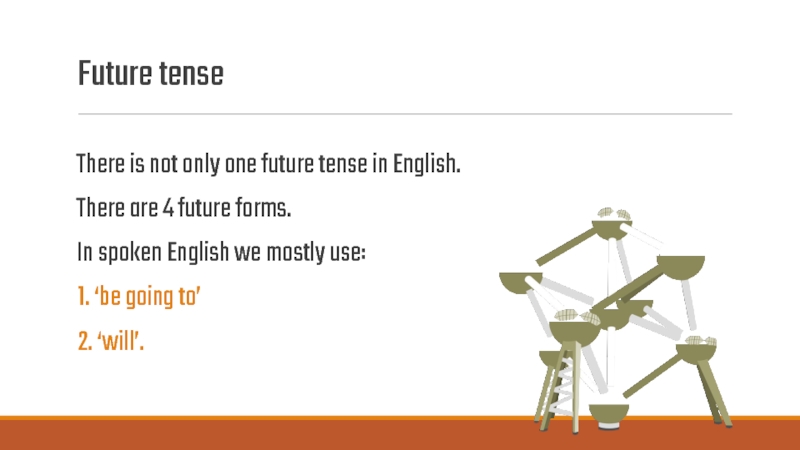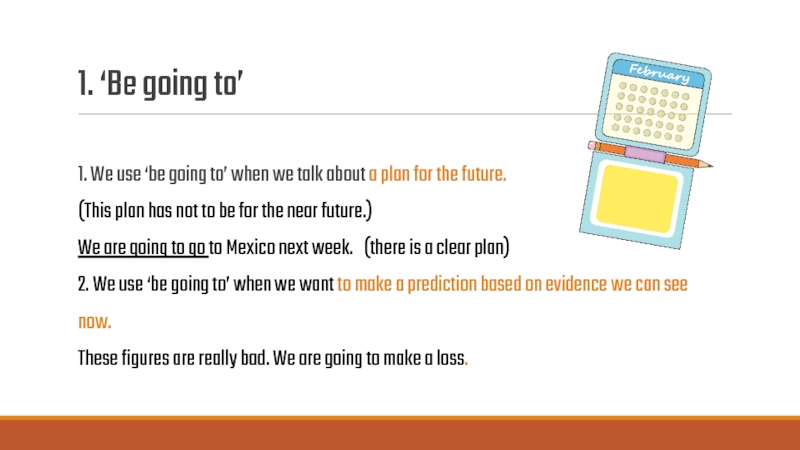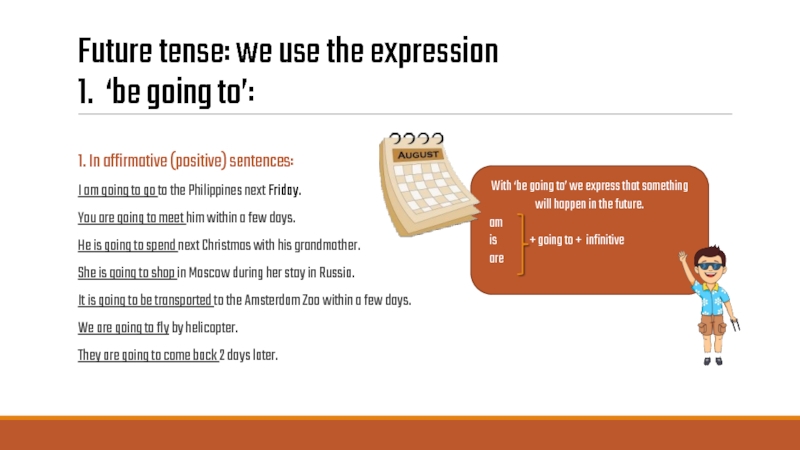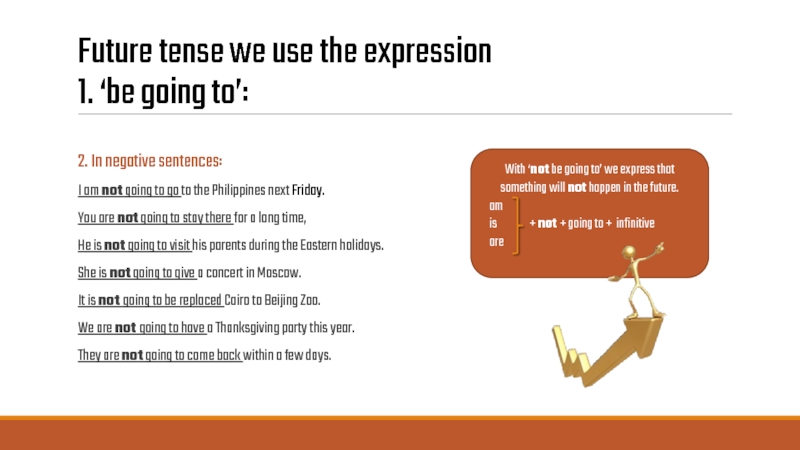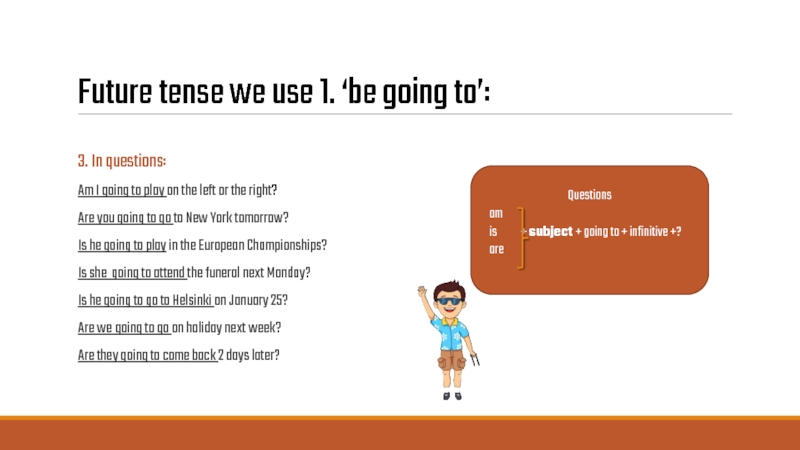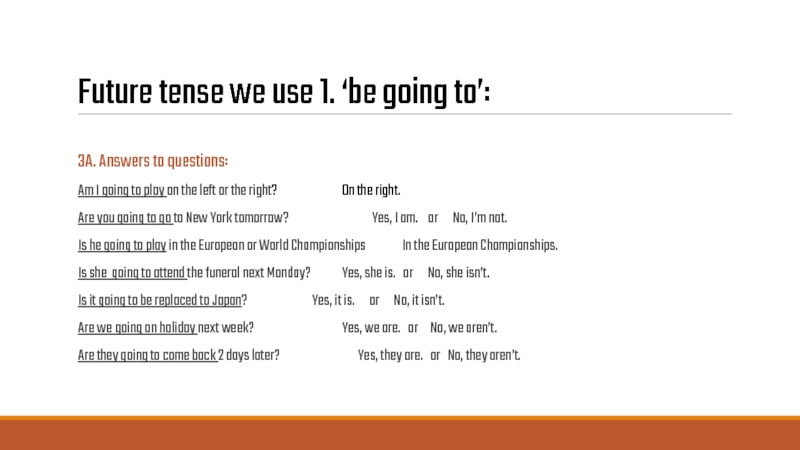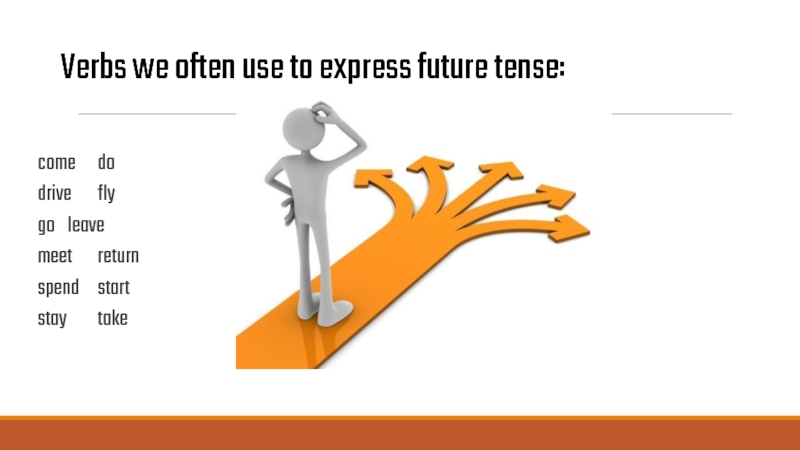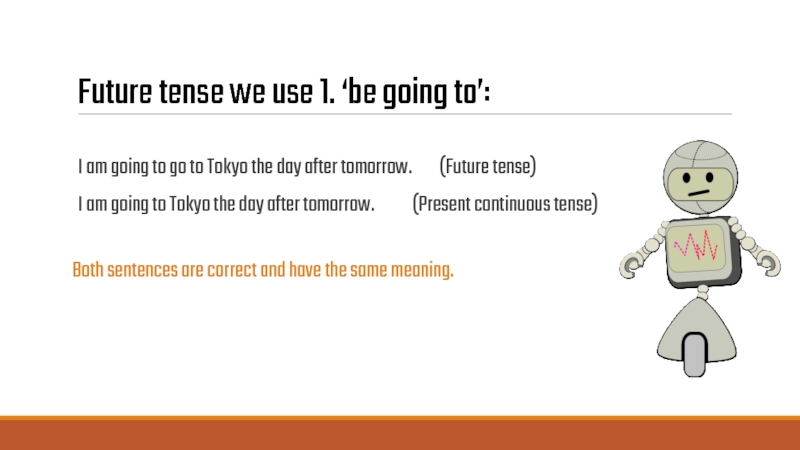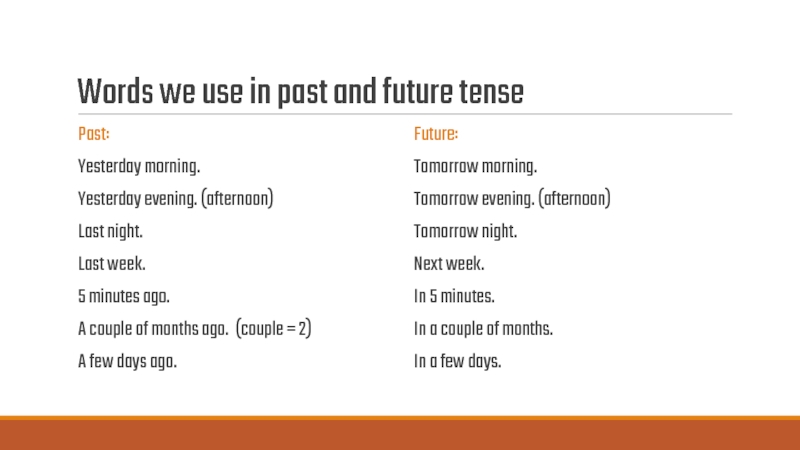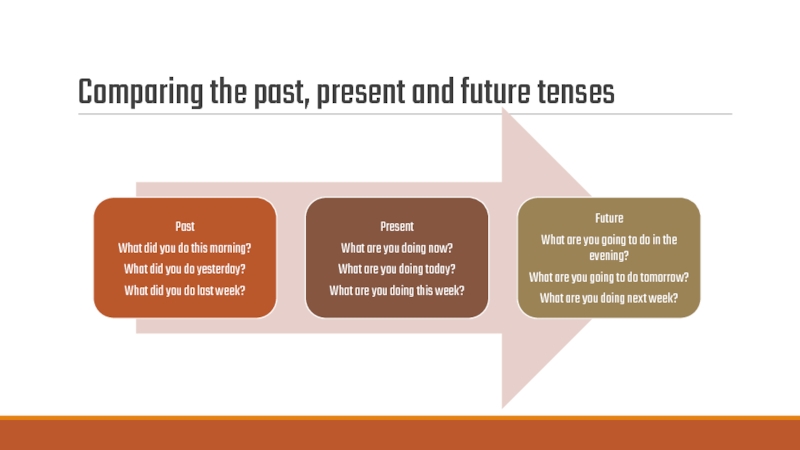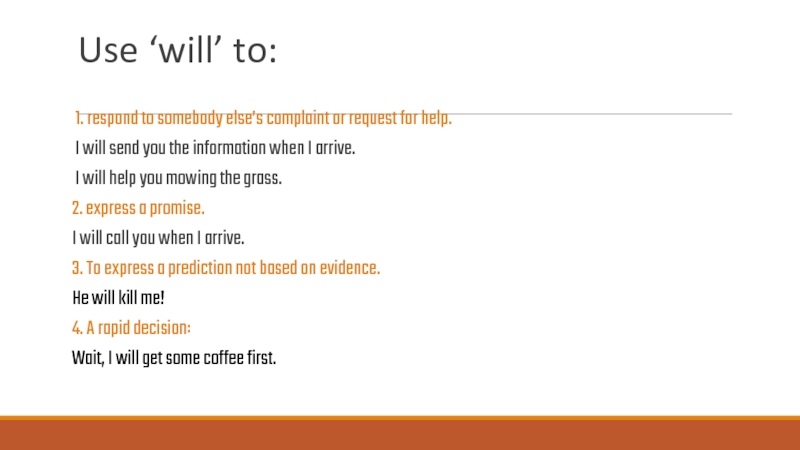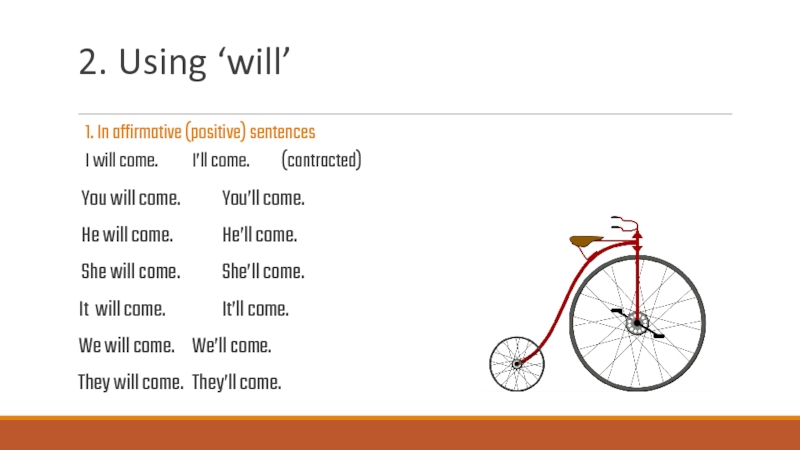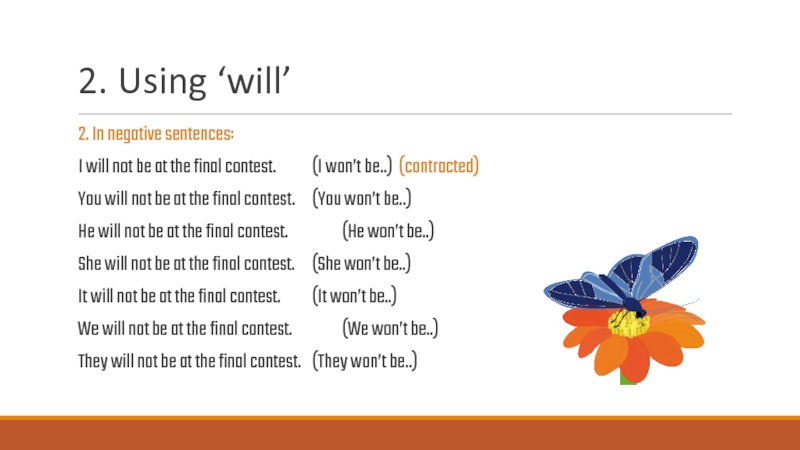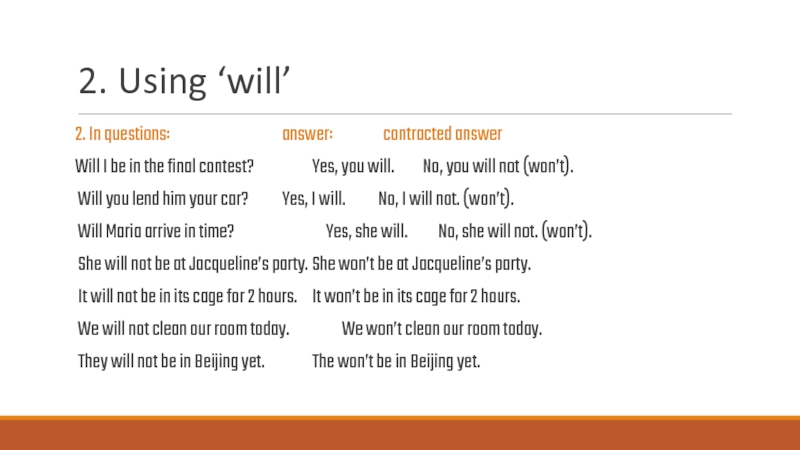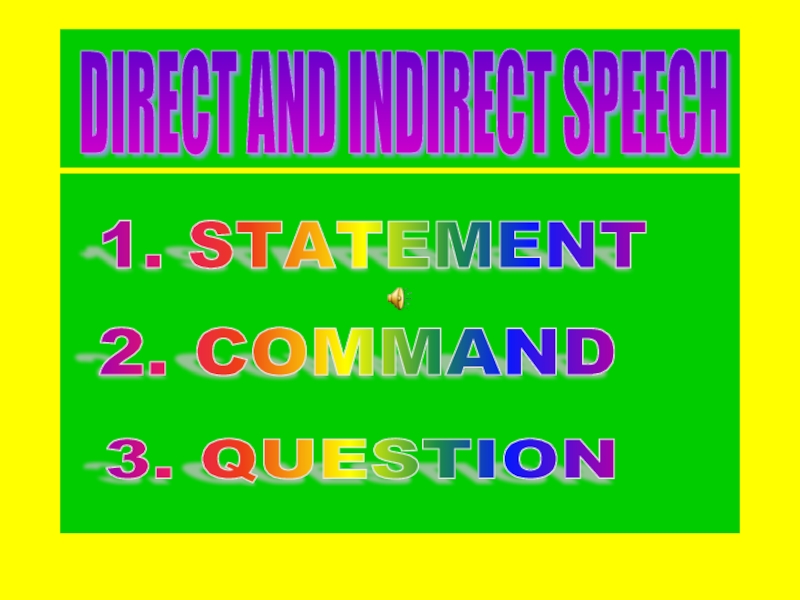- Главная
- Разное
- Дизайн
- Бизнес и предпринимательство
- Аналитика
- Образование
- Развлечения
- Красота и здоровье
- Финансы
- Государство
- Путешествия
- Спорт
- Недвижимость
- Армия
- Графика
- Культурология
- Еда и кулинария
- Лингвистика
- Английский язык
- Астрономия
- Алгебра
- Биология
- География
- Детские презентации
- Информатика
- История
- Литература
- Маркетинг
- Математика
- Медицина
- Менеджмент
- Музыка
- МХК
- Немецкий язык
- ОБЖ
- Обществознание
- Окружающий мир
- Педагогика
- Русский язык
- Технология
- Физика
- Философия
- Химия
- Шаблоны, картинки для презентаций
- Экология
- Экономика
- Юриспруденция
The future tense презентация
Содержание
- 1. The future tense
- 2. Future tense There is not
- 3. 1. ‘Be going to’ 1. We
- 4. Future tense: we use the expression 1.
- 5. Future tense we use the expression 1.
- 6. Future tense we use 1. ‘be going
- 7. Future tense we use 1. ‘be going
- 8. come do
- 9. Future tense we use 1. ‘be going
- 10. Words we use in past and future
- 11. Comparing the past, present and future tenses
- 12. 2. Will
- 13. Use ‘will’ to:
- 14. 2. Using ‘will’
- 15. 2. Using ‘will’
- 16. 2. Using ‘will’
Слайд 2Future tense
There is not only one future tense in English.
In spoken English we mostly use:
1. ‘be going to’
2. ‘will’.
Слайд 31. ‘Be going to’
1. We use ‘be going to’ when we
(This plan has not to be for the near future.)
We are going to go to Mexico next week. (there is a clear plan)
2. We use ‘be going to’ when we want to make a prediction based on evidence we can see
now.
These figures are really bad. We are going to make a loss.
Слайд 4Future tense: we use the expression
1. ‘be going to’:
1. In affirmative
I am going to go to the Philippines next Friday.
You are going to meet him within a few days.
He is going to spend next Christmas with his grandmother.
She is going to shop in Moscow during her stay in Russia.
It is going to be transported to the Amsterdam Zoo within a few days.
We are going to fly by helicopter.
They are going to come back 2 days later.
With ‘be going to’ we express that something will happen in the future.
am
is + going to + infinitive
are
Слайд 5Future tense we use the expression
1. ‘be going to’:
2. In negative
I am not going to go to the Philippines next Friday.
You are not going to stay there for a long time,
He is not going to visit his parents during the Eastern holidays.
She is not going to give a concert in Moscow.
It is not going to be replaced Cairo to Beijing Zoo.
We are not going to have a Thanksgiving party this year.
They are not going to come back within a few days.
With ‘not be going to’ we express that something will not happen in the future.
am
is + not + going to + infinitive
are
Слайд 6Future tense we use 1. ‘be going to’:
3. In questions:
Am I
Are you going to go to New York tomorrow?
Is he going to play in the European Championships?
Is she going to attend the funeral next Monday?
Is he going to go to Helsinki on January 25?
Are we going to go on holiday next week?
Are they going to come back 2 days later?
Questions
am
is + subject + going to + infinitive +?
are
Слайд 7Future tense we use 1. ‘be going to’:
3A. Answers to questions:
Am
Are you going to go to New York tomorrow? Yes, I am. or No, I’m not.
Is he going to play in the European or World Championships In the European Championships.
Is she going to attend the funeral next Monday? Yes, she is. or No, she isn’t.
Is it going to be replaced to Japan? Yes, it is. or No, it isn’t.
Are we going on holiday next week? Yes, we are. or No, we aren’t.
Are they going to come back 2 days later? Yes, they are. or No, they aren’t.
Слайд 8
come do
drive fly
go leave
meet return
spend start
stay take
Verbs
Слайд 9Future tense we use 1. ‘be going to’:
I am going to
I am going to Tokyo the day after tomorrow. (Present continuous tense)
Both sentences are correct and have the same meaning.
Слайд 10Words we use in past and future tense
Past:
Yesterday morning.
Yesterday evening. (afternoon)
Last
Last week.
5 minutes ago.
A couple of months ago. (couple = 2)
A few days ago.
Future:
Tomorrow morning.
Tomorrow evening. (afternoon)
Tomorrow night.
Next week.
In 5 minutes.
In a couple of months.
In a few days.
Слайд 13Use ‘will’ to:
1. respond to somebody else’s complaint or
I will send you the information when I arrive.
I will help you mowing the grass.
2. express a promise.
I will call you when I arrive.
3. To express a prediction not based on evidence.
He will kill me!
4. A rapid decision:
Wait, I will get some coffee first.
Слайд 142. Using ‘will’
1. In affirmative (positive) sentences
I
You will come. You’ll come.
He will come. He’ll come.
She will come. She’ll come.
It will come. It’ll come.
We will come. We’ll come.
They will come. They’ll come.
Слайд 152. Using ‘will’
2. In negative
I will not be at the final contest. (I won’t be..) (contracted)
You will not be at the final contest. (You won’t be..)
He will not be at the final contest. (He won’t be..)
She will not be at the final contest. (She won’t be..)
It will not be at the final contest. (It won’t be..)
We will not be at the final contest. (We won’t be..)
They will not be at the final contest. (They won’t be..)
Слайд 162. Using ‘will’
2. In questions:
Will I be in the final contest? Yes, you will. No, you will not (won’t).
Will you lend him your car? Yes, I will. No, I will not. (won’t).
Will Maria arrive in time? Yes, she will. No, she will not. (won’t).
She will not be at Jacqueline’s party. She won’t be at Jacqueline’s party.
It will not be in its cage for 2 hours. It won’t be in its cage for 2 hours.
We will not clean our room today. We won’t clean our room today.
They will not be in Beijing yet. The won’t be in Beijing yet.

